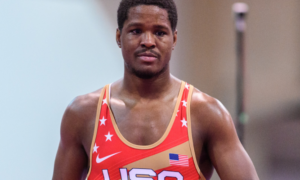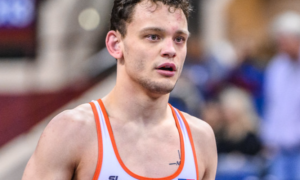Two-time Trials winner RaVaughn Perkins (72 kg, NYAC) has been back in his home state of Nebraska this week. Naturally, visiting with family and friends is part of it, but that doesn’t mean a guy like Perkins is able to just “turn wrestling off”, certainly not completely. The only difference is that in this case, it wasn’t his own training he was concerned with. Instead, Perkins took advantage of an opportunity to share his knowledge with the next generation.
Perkins ventured 14 miles southwest of where he grew up in Omaha and showed up at MWC, 2018 Senior World Team coach Zac Dominguez’s ultra-successful wrestling academy. The youth athletes in attendance are currently gearing up for the impending spring Greco season, so the timing made sense. Perkins, 25, returned to the US a couple of weeks ago following his bronze medal performance at the Thor Masters Invitational in Denmark. Since there is just a little downtime before training heats up for the US Open and World Team Trials, he figured spending an evening with a roomful of future studs might make a difference for them given the time of year.
“It was a great time because they are all getting ready for their seasons and some of them will be going to the Junior Trials in April,” Perkins said. “I was able to talk to them about how the refs are going to be looking for passive wrestling and negative wrestling. I’m the type of wrestler who hates being passive. I want to see points being scored and I want to see that from myself, too. So I just showed these guys how to get into good positions, positions they need to score in. They’re simple positions. I score from these positions, they’re easy, but if no one can stop it, why change it?”
One thing youth wrestlers love about learning from high-level Senior athletes is the collection of new moves they might pick up. But not all clinicians are giving. Some athletes who are still in the thick of their careers prefer to limit what they show out of misguided paranoia or simply because they’re not sure if what they have will work for everyone else. Not Perkins. If anything, he made sure to break out his catalog of favorites due to the sheer fact he is convinced of their universal applicability.
“Well, yeah, I’m going to show my go-to moves because they work and they are offensive moves,” noted Perkins. “Plus, they’re so simple, just quick and easy to learn. Most of those guys caught onto them really quick and if they keep working on them, they can create action in their own matches.”
Perkins wasn’t solely focused on technical finer points and the rule update. As one of the most perceptive and analytical Greco athletes in the US, he is always performing appraisals of how the sport is being competed while remaining steadfast to his own style. One particular area of concentration for Perkins lately has been the American approach. US combatants are often referred to as “grinders”, which although requires its own iron-jawed skill-set, it’s a method that doesn’t usually translate into points on the mat. It’s something Perkins knows has to change if United States athletes are going to continue to improve internationally.
“The most important thing, not even just for the kids but for every US Greco wrestler, is that we have to get into our positions and go for our moves because we’re the ones who are going to be called for passive, anyway,” offered Perkins. “We have to push the action and score. We have to be the ones to score on our feet. Everyone knows that in the US we’re not good in par terre. It’s not a secret, everyone knows it. We lost all of our matches in Rio either because we couldn’t get turns or because we got turned. I talked to them about that, how we have to score and how we can’t be defensive. We have to keep our heads up and wrestle the whole time.”
All in all, Perkins enjoyed popping in at MWC, seeing Dominguez, and putting on his coaching hat if only for a little while. Most of the year isn’t like this for him. Between putting in multiple sessions per day at the Olympic Training Center in Colorado Springs and traveling for camps and competitions, Perkins rarely finds time to hone in on the age-group athletes who one day hope to join his ranks. The night meant something to him and he walked away encouraged by what he saw in the room.
“It was good working with those guys because they could be the future.”
CLICK HERE TO DONATE TO THE USA GRECO-ROMAN PROGRAM
Listen to “5PM14: Northern Michigan’s Dalton Roberts” on Spreaker.
SUBSCRIBE TO THE FIVE POINT MOVE PODCAST
iTunes | Stitcher | Spreaker | Google Play Music | RSS


















